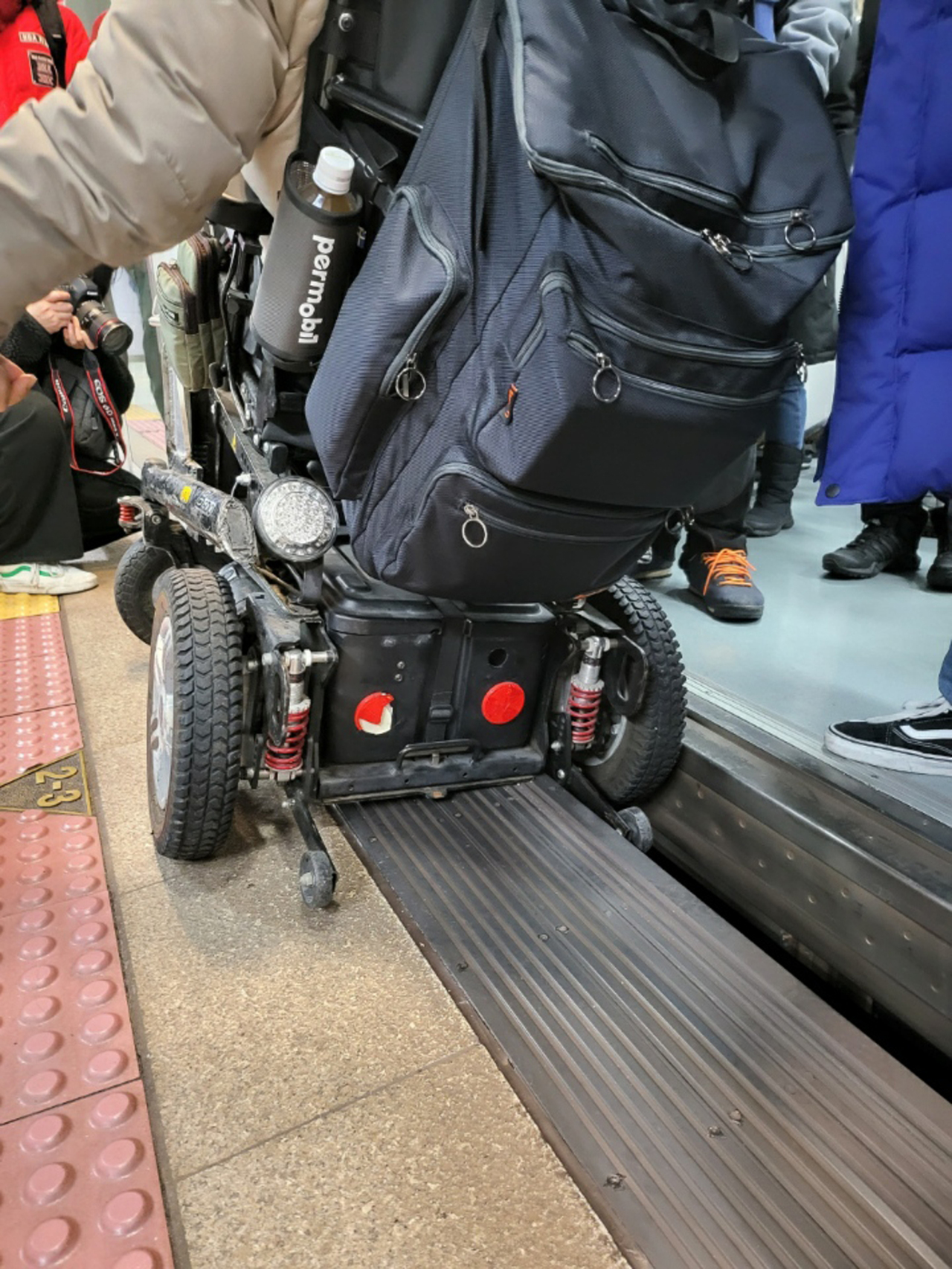Demanding to be heard, disability groups disrupt rush-hour trains
Group steps up protest action; calls for better access to public transportation
By Park Han-naPublished : Dec. 20, 2021 - 18:09

An association of civic groups in South Korea stepped up actions in their campaign to raise awareness for the mobility rights of the disabled, staging simultaneous rallies at subway stations during the morning rush hour.
From around 7 a.m. Monday, scores of activists and disabled persons affiliated with the Solidarity against Disability Discrimination showed up at four stations -- Gwanghwamun, Wangsimni, Yeouido and Haengdang -- all on Line No. 5.
Some people in wheelchairs deliberately put their wheels into the gap between train cars and the edge of station platforms, preventing the train from departing. At Wangsimni, a screen door between the train and the platform ended up damaged.

“Mobility is a basic right that must be guaranteed,” read placards held by protesters.
Due to their protest, train services were disrupted for as long as one hour and 40 minutes, according to Seoul Metro.
This was not the first time that the group staged a demonstration during the morning rush hour. On Dec. 3 and 13, members had turned up at busy stations, including Hyehwa on Line No. 4, causing some delays.
The protests come as the revision bill to the Act on Promotion of the Transportation Convenience of Mobility Disadvantaged persons had showed little progress at the National Assembly.

“Our fight for mobility rights, which was triggered by the tragic fall and subsequent death of an elderly couple with disabilities using a vertical wheelchair lift at Oido Station on Jan. 22, 2001, marked 20 years this year,” the group said in a statement.
“Over the years, we have been fighting to guarantee the rights to move that excluded no one,” it added, stressing that past efforts should culminate in the amendment of the above mentioned law.
The revision bill in question stipulates a mandatory introduction of low-floor buses across the country and elimination of disparities between Seoul and other regions in building public transport infrastructure for the handicapped.
They also call for central government funding and engagement in the operation of transport support centers for disabled people, which are currently run by provincial and municipal authorities. The center provides taxis and vans for severely disabled individuals, elderly people aged over 65 and pregnant women.
After Monday’s protest at the stations, activists flocked to the private residence of Finance Minister Hong Nam-ki in Seoul’s Mapo district, asserting that the Finance Ministry is obstructing the passage of the revision bill by refusing to earmark government funds for related programs.
“The Ministry of Economy and Finance, which is the obligatory body to ensure this, is opposed to using the central government budget for the mobility of the disabled,” the group claimed.
On Wednesday, the Assembly’s Land, Infrastructure and Transport Committee is scheduled to deliberate on the bill.



![[AtoZ into Korean mind] Humor in Korea: Navigating the line between what's funny and not](http://res.heraldm.com/phpwas/restmb_idxmake.php?idx=644&simg=/content/image/2024/04/22/20240422050642_0.jpg&u=)

![[Exclusive] Korean military set to ban iPhones over 'security' concerns](http://res.heraldm.com/phpwas/restmb_idxmake.php?idx=644&simg=/content/image/2024/04/23/20240423050599_0.jpg&u=20240423183955)

![[Herald Interview] Why Toss invited hackers to penetrate its system](http://res.heraldm.com/phpwas/restmb_idxmake.php?idx=644&simg=/content/image/2024/04/22/20240422050569_0.jpg&u=20240422150649)
![[Graphic News] 77% of young Koreans still financially dependent](http://res.heraldm.com/phpwas/restmb_idxmake.php?idx=644&simg=/content/image/2024/04/22/20240422050762_0.gif&u=)







![[Exclusive] Korean military to ban iPhones over security issues](http://res.heraldm.com/phpwas/restmb_idxmake.php?idx=652&simg=/content/image/2024/04/23/20240423050599_0.jpg&u=20240423183955)



![[Today’s K-pop] Ateez confirms US tour details](http://res.heraldm.com/phpwas/restmb_idxmake.php?idx=642&simg=/content/image/2024/04/23/20240423050700_0.jpg&u=)